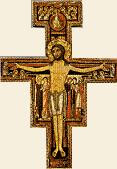 After having spoken at length concerning what Franciscan spirituality is, let us find out who is a true Franciscan.
After having spoken at length concerning what Franciscan spirituality is, let us find out who is a true Franciscan. He is a true Franciscan passionate with the threefold desire of our Seraphic Father. ‘Our holy Father Francis… burned with a threefold desire: that he might be a perfect imitator of Christ by perfect virtue; likewise that he would be able to cling to God alone through his love for constant contemplation; and also that he would be able to gain many for God and save the souls for whom Christ willed to be crucified and to die.''
‘He did not consider himself a friend of Christ unless he cared for souls, whom Christ redeemed. He said that nothing was to be preferred to the salvation of souls, proving this especially by the fact that the Only–begotten Son of God deigned to hang upon a cross for them.' ' Hence he who is not inflamed with the desire to gain souls for Christ is not a true Franciscan. Celano tells us: ‘We are sent to the aid of priests for the salvation of souls, so that what may be found wanting in them, may be supplied by us.’
All Franciscans are called to the Apostolate, but to an apostolate that is preached more effectively by actions than by words. In his first rule, Saint Francis says: ‘Let all… preach by their deeds,’ that is, by example. But even more than this, souls are saved by prayer, sacrifice, and suffering, following the example of Christ, who performed the greatest work of Redemption on the Cross.
The abundant harvest of the Apostolate is not limited to only a few. All ordained friars, nuns, secular and lay brothers and sisters should work for the salvation of souls. In other words, the entire family, as one entity, has the duty of sharing in the Apostolate. The reason for this is that Christ is the true Savior of souls, and Christ Himself lives and works in the community. Hence the Apostolate does not consist in the work of the preacher only, or the one given to prayer, or the sufferer alone, but each one acting according to his own individual calling but all toward a common end.
What a marvelous work of charity this is, which constitutes the Apostolate of Christ as well as the Apostolate of the community. He also is a true Franciscan who is passionate with the second desire of our Seraphic Father: ‘that he would be able to cling to God alone, through his love for constant contemplation.’
The goal of every soul is to be united with Almighty God in perfect love. This union is the necessary condition for every Apostolate for preaching and suffering. Unless God Himself works within a person, his preaching, whether it is by words or actions, is to no avail. A person's sufferings are of no value unless he suffers in Christ, making up for ‘those things that are lacking in His sufferings.’
Finally, a true Franciscan is on fire with the prime desire to become one with Christ by imitation of Him, transformation into Him, and identification with Him. Union with God, and a return to the Father are not achieved except by one who becomes another Christ: ‘No one comes to the Father but through Me.’













